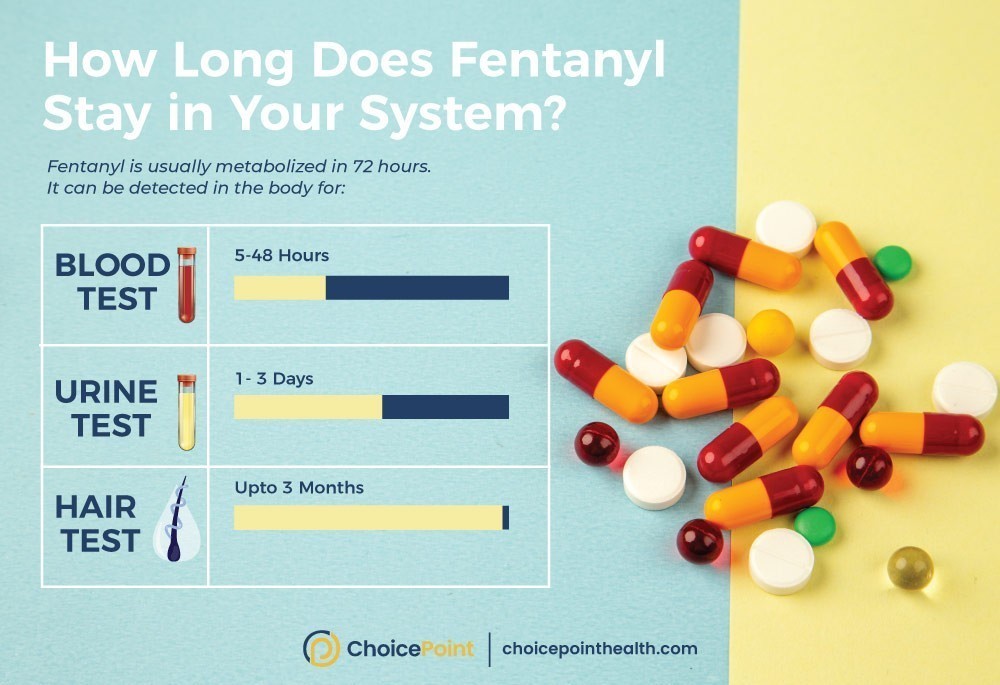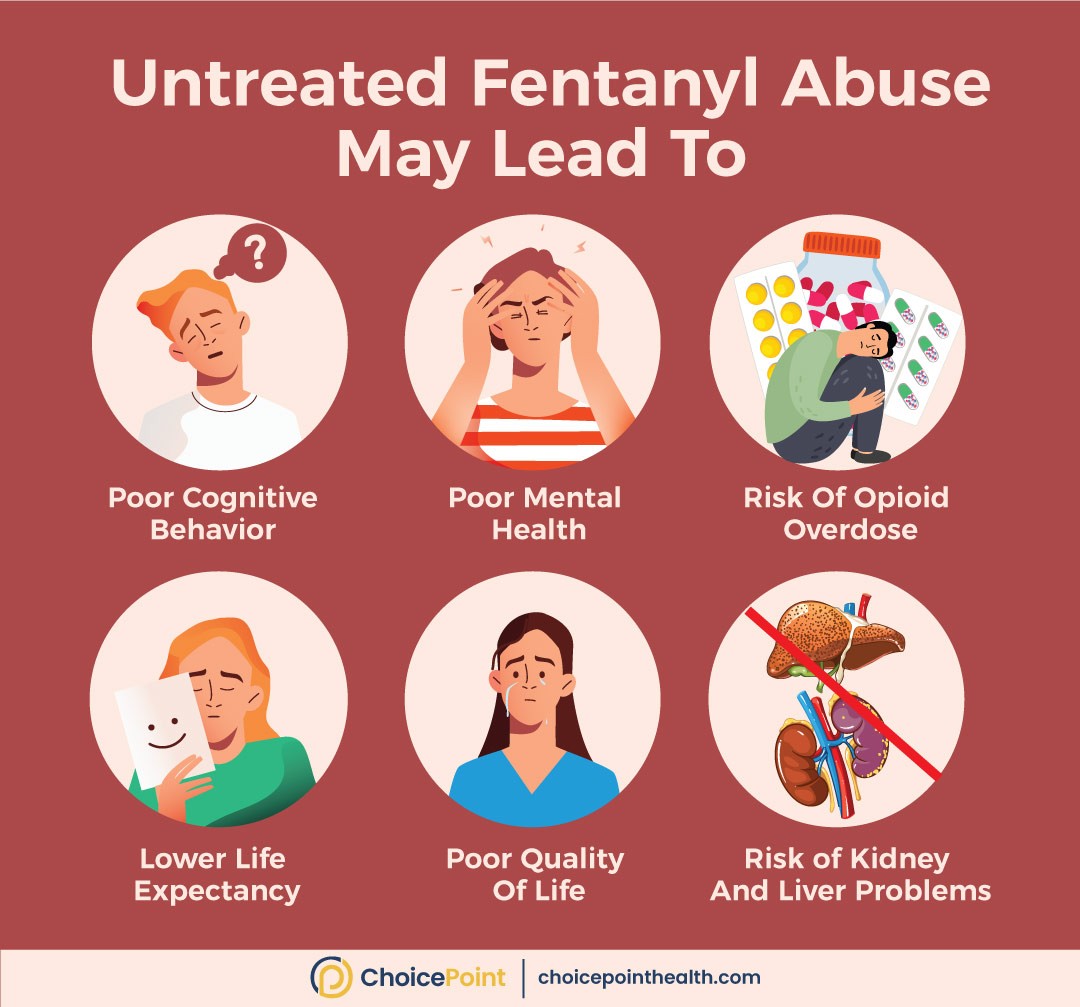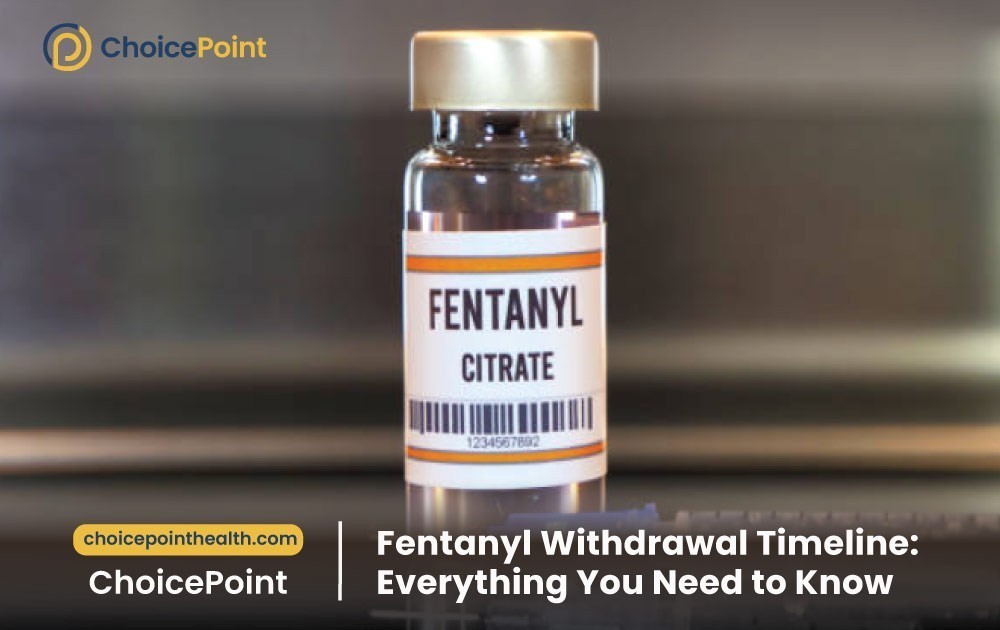Fentanyl is a synthetic opioid used in pain management. It is approximately 100 times more potent than Morphine! The United States government has now labeled Fentanyl as the next wave of the opioid crisis. It is one of the most abused opioid drugs and a significant contributor to opioid-related overdose deaths.
If you want to start your treatment, ChoicePoint is here to make this process easier by providing detailed information about the Fentanyl withdrawal timeline, symptoms, and treatment to help you initiate and commit to long-lasting recovery.
Table of Contents
Fentanyl Abuse Has Hit Alarming Levels!
Did you know that according to the CDC Government, a shocking 12 times increase in synthetic opioid-related overdose was observed from 2013 – 2019 But, it does not stop here! A record 30% increase in drug overdose deaths was recorded in 2020, with Fentanyl being the major abused drug.
Fentanyl addiction has life-threatening consequences. And a medical detox is the only way to manage this. We are here to help you rebuild your life. So, let’s start by discussing fentanyl withdrawal symptoms.
Fentanyl Withdrawal Symptoms
Fentanyl is a prescription-based drug. It is usually given to patients who have developed tolerance to other opioids. It is used to treat intense pain, such as after surgery or pain management in cancer patients.
It has high abuse potential. If you have used this drug for a prolonged duration or if you use more than recommended dose, then you may experience withdrawal symptoms such as:
- Increased anxiety
- Diarrhea and vomiting
- Insomnia
- Increased body temperature
- Increased heart rate
- Chills
- Body ache
Fentanyl Withdrawal Timeline and Stages: What to Expect?
Fentanyl has a half-life of 8-10 hours. This means that you may experience withdrawal symptoms somewhere between 6-12 hours after the last dose.
There are usually three stages observed during fentanyl withdrawal:
Stage1: Early Withdrawal
Early-stage may begin within 6-12 hours or as late as after 30 hours. During this duration, you may experience mild withdrawal symptoms such as:
- Insomnia
- Fatigue
- Anxiety
- Irritability
- Muscle pain
- Body ache
Stage 2: Acute Withdrawal
You may feel intense withdrawal symptoms after 24-48 hours, and these symptoms usually peak after 72 hours. Severe withdrawal symptoms include:
- Increased anxiety and depression
- Sweating
- Abdominal cramps
- Nausea and vomiting
- Diarrhea
- Muscle spasm
Stage 3: Protracted Withdrawal
Protracted withdrawal symptoms are the symptoms that persist after the acute withdrawal phase. These may last up to a month.
SAMHSA lists these symptoms that may result after opioid abuse:
- Anxiety
- Trouble sleeping
- Difficulty in concentrating
- Headaches
- Dysphoria (feeling down or emotionally blunted)
- Irritability
- Drug cravings
If you are an expecting mother and looking for detox while pregnant, you are welcome to read the ultimate Do’s and Don’ts of drug detox while pregnant for long-lasting recovery.
Factors Affecting Fentanyl Withdrawal Duration
Symptoms vary from person to person. There is no set fentanyl withdrawal timeline duration and symptoms that can be considered as a standard.
Some factors that affect the duration include:
- Dose of Fentanyl
- Duration of abuse
- History of opioid abuse
- Polydrug use – If Fentanyl has been used with other drugs
Are you looking for detox centers in NJ that accept all insurances? ChoicePoint’s outpatient detox center in NJ aims to bring down the cost of high-quality addiction treatment by working with all insurance companies. You can verify your insurance by filling out this simple form.

How Long Fentanyl Stays in Your System
Different Forms of Fentanyl and Withdrawal Duration
Fentanyl is also available in injection and patch forms. The withdrawal timeline is different for all of these forms:
Fentanyl Injection: The commercial name is Sublimaze. Injectable Fentanyl is prescribed in the cases of extreme pain management, such as after surgery or cancer pain treatment. The withdrawal duration of injectable Fentanyl is usually longer than the standard duration.
Fentanyl Patch: Fentanyl patches are also known as transdermal patches and are sold under the brand name Duragesic. These are prescribed to people who need round-the-clock medication. Fentanyl patches should be used with great care because these have higher abuse potential. The withdrawal timeline is also longer because the dose has to be gradually decreased. You can not stop using it at once.
Fentanyl Withdrawal Is Difficult, but Why Should You Commit to It?
Are you currently in the middle of treatment and losing hope for a speedy recovery? Have you experienced a relapse, and now you think you might be beyond help?
By thinking about recovery, you are already halfway there! Every worthy act is always difficult, but the reward is long-lasting. All you have to do is keep an ultimate eye on the goal and trust the medical process.
You should get immediate help for fentanyl addiction because:
Fentanyl Overdose Can Lead to Severe Respiratory Distress
The DEA has listed Fentanyl as even more potent than Heroin. And Carfentanil, an analog of Fentanyl, is 10,000 times more potent than Morphine.
This is because Fentanyl has high overdose potential. A major side effect of a Fentanyl overdose is severe respiratory distress. Respiratory distress is a lung condition. During this, the lungs fill up with fluid, and the oxygen supply is disrupted. It leads to severe hypoxia (lack of oxygen in the body). This means that the oxygen does not reach the organs, resulting in a coma or even death!
Narcan (Naloxone) is an excellent option to prevent opioid overdose. If you or a loved one is suffering from an opioid overdose, you should always carry it. Read our blog on Naltrexone vs Naloxone to learn how to administer it in case of emergency.
Mixing Fentanyl and Alcohol Has Dangerous Consequences.
Taking opioids with alcohol can have life-threatening consequences. Fentanyl and alcohol are both central nervous system depressants. If you take Fentanyl with alcohol, you may feel breathing problems along with:
- Drowsiness
- Respiratory distress
- Low blood pressure
- Fainting
- Coma
You May Be Consuming Fentanyl Without Even Knowing It.
Another alarming fact about Fentanyl is that it is being mixed with other drugs such as cocaine. According to a report issued by DEA in 2016, less than 1% of cocaine samples tested had synthetic opioids in them, and it rose to 3.3% in 2020.
It was further noted that Fentanyl is also mixed with the already potent drug Heroin, which significantly increases the chance of fentanyl overdose.
How to Treat Fentanyl Withdrawal Symptoms?
Now that you are aware of the dangers of fentanyl abuse and a part of you is ready to begin the treatment process for a better tomorrow, you can count on licensed doctors at ChoicePoint to provide the best detox and addiction treatment programs.
Medical Detox from Fentanyl
When it comes to the treatment, it is best to always trust the experts. At ChoicePoint, all our doctors and clinicians are DEA certified who can help you safely withdraw from Fentanyl. Our admission process begins with a free evaluation. You can fill out this simple form, and our team will contact you. A minute of your time can help you rebuild your whole life.
Medical detox is absolutely important because leaving this drug cold turkey can worsen the withdrawal symptoms. Leaving Fentanyl cold turkey has been linked to:
- Greater risk of overdose
- Severe diarrhea and vomiting
- Electrolyte imbalance
- Breathing problems
- Swelling in lungs due to vomiting
Treatments During Detox
Your doctor may devise two strategies for the treatment of fentanyl withdrawal symptoms:
- Tapering off Medications
Your doctor may gradually decrease the dose of Fentanyl; this may happen if you are using a high dose of Fentanyl such as injectable or patch form.
- Medication-Assisted Treatment
Medication-assisted treatment or MAT is the safe use of medications to help you withdraw from Fentanyl. The medication prescribed usually binds to the same opioid receptors as Fentanyl and reduces frequent cravings.
Some medications that may be prescribed includes:
- Suboxone – to reduce frequent cravings
- Buprenorphine – Opioid antagonist to reduce cravings prevent relapse
- Naltrexone – To treat both opioid and alcohol dependency
- Naloxone – To treat Fentanyl overdose
- Antidepressants – To treat anxiety associated with withdrawal
Suboxone is a highly effective drug to treat opioid abuse. If you want to learn more about suboxone and how to get a same-day prescription, please take a minute to read our blog explaining all the details.

6 Common Fentanyl Abuse Symptoms
Alcohol and Drug Detox Center at Fair Lawn New Jersey
Do you still think that a detox is only possible at rehab? Are you delaying your treatment because the thought of being away from your loved ones scares you?
It is possible to begin and complete your treatment without being required to stay at the in-patient residence facility. With ChoicePoint’s outpatient drug detox program in NJ, you can begin your addiction-free life without putting your life on hold. Instead, you can complete your treatment at our addiction treatment center and return home to be with your loved ones.
You can visit our North Jersey outpatient addiction treatment center at North Jersey, Fair Lawn in Bergen County, New Jersey. Or you can call us at 844.445.2563 for a virtual consultation.
Some features of our treatment programs include:
- Insurance coverage
- Free pre-screening
- Online support
- Confidential treatments
- Cost-effective than in-patient treatment
A Step Beyond Fentanyl Withdrawal Treatment
You may be searching about the Fentanyl withdrawal timeline because you might be suffering from addiction. However, most people suffering from addiction also suffer from mental health problems. So it is important to get treatment for both of these co-occurring disorders.
Therapy is the best way to treat mental health problems. ChoicePoint offers in-person and virtual treatment programs. We can treat you wherever you are and whenever you need it. Our therapy programs include:
- Cognitive-Behavioral Therapy – A treatment for a wide range of mental disorders, including anxiety, depression, personality disorders, negative thoughts, drugs, and alcohol abuse.
- Dialectical Behavioral Therapy – Targeted therapy improves emotional stability, borderline personality disorders, behavioral patterns, and self-harm thoughts.
- Family Therapy – Many people use drugs because of family history. Family therapy aims to improve communication and resolve any conflicts.
- Group Therapy – Group therapy is a fruitful connection among other people going through the same situation as you. You can learn from their experience and share your thoughts to benefit from each other’s experiences.
- Individual Therapy – Individual therapy is for you if you prefer a more confidential setting. It is one-on-one sessions to help you cope with all of your problems.
Targeted Therapy Just a Click Away! You can begin your healing process today by calling us at 844.445.2563 or connect with us online. Our licensed therapists in NJ are here to help you recover from substance abuse and mental health problems in a safe and confidential environment. We treat all our clients with compassion and care. So don’t wait any further and become a part of ChoicePoint addiction warriors today!
Final Verdict
There is no standard fentanyl withdrawal timeline that applies to everyone. And, this is a good thing. Why? Because ChoicePoint believes that each individual is unique and requires custom treatment. What works for one person may not work for the other person.
ChoicePoint respects your individuality and offers detox plans specially designed according to your requirements. We understand that there are a thousand addiction treatment programs, so why should you choose us? The answer is simple, for us, you come first. We offer free pre-screening so you can see for yourself that we deliver what we claim.
Don’t wait any further and reclaim your life from substance abuse by calling us at 844.445.2563 or by visiting our addiction treatment and detox center at North Jersey, Fair Lawn location in Bergen County, New Jersey.
Medical Disclaimer:
ChoicePoint aims to improve the quality of life for people struggling with substance use disorder and mental health issues. Our team of licensed medical professionals research, edit and review the content before publishing. However, this information is not intended to be a substitute for professional medical advice, diagnosis, or treatment. For medical advice please consult your physicians or ChoicePoint's qualified staff.

Get Help Now!








Review Fentanyl Withdrawal Timeline: Everything You Need to Know.